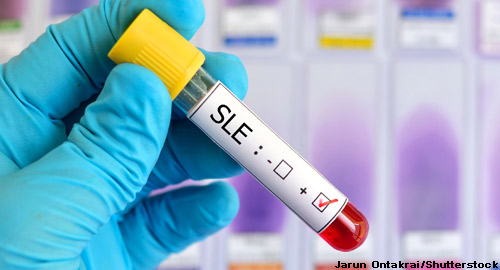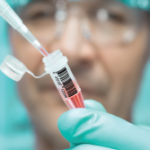 Although treatments for systemic lupus erythematosus (SLE) exist, patients still have many unmet needs. The arsenal to treat SLE consists primarily of glucocorticoids and antimalarials, all of which are associated with considerable toxicity. Researchers have sought to improve SLE symptoms by targeting B cells with new drug treatments. One such drug is belimumab, a monoclonal antibody that targets B-lymphocyte activating factor and appears to be most effective in a subset of patients with greater serological and clinical disease activity at baseline.
Although treatments for systemic lupus erythematosus (SLE) exist, patients still have many unmet needs. The arsenal to treat SLE consists primarily of glucocorticoids and antimalarials, all of which are associated with considerable toxicity. Researchers have sought to improve SLE symptoms by targeting B cells with new drug treatments. One such drug is belimumab, a monoclonal antibody that targets B-lymphocyte activating factor and appears to be most effective in a subset of patients with greater serological and clinical disease activity at baseline.
Immunological abnormalities associated with SLE include an IFN-I signature, as well as involvement of both the interleukin (IL) 12 and IL-23 cytokine pathways. Ustekinumab, a monoclonal anti-IL-12 and anti-IL-23 antibody, is approved for use in adults with psoriatic arthritis and Crohn’s disease and adult and adolescent patients with plaque psoriasis. Results from a recent multicenter Phase 2 trial of 102 patients (ustekinumab, n=60; placebo, n=42) suggest the addition of ustekinumab to standard-of-care treatment for active SLE results in better efficacy than placebo. The study also revealed a safety profile consistent with the safety profile of ustekinumab therapy in other diseases. The results underscore the possibility that IL-12, IL-23 or both play important roles in the immunopathology of SLE. Ronald F. van Vollenhoven, professor of rheumatology at the Amsterdam University Medical Centers in the Netherlands, and colleagues published their findings online in Lancet.1
The investigators note the heterogeneous presentation of SLE can make it difficult to measure changes in disease activity and response to therapy. Therefore, they chose to look at global SLE disease activity responder index 2000 (SLEDAI-2K) and, specifically, the percentage of patients achieving a SLEDAI-2K responder index-4 (SRI-4) response. They also measured joint counts, mucocutaneous disease and disease flares, as well as C3 complement concentrations and anti-double stranded DNA autoantibodies at baseline and Week 24.
“To the best of our knowledge, this study is the first to report efficacy and safety of an anti-IL-12 and IL-23 antibody in SLE,” write the authors. “In this randomized controlled trial, a significantly greater proportion of ustekinumab-treated patients achieved the SRI-4 primary endpoint at Week 24 than those who received placebo, when added to standard-of-care therapy. Similarly, greater proportions of ustekinumab-treated patients achieved more stringent levels of global response (SRI-5 or SRI-6) at Week 24 than those who received placebo.”
Specifically, at 24 weeks, 62% of patients in the ustekinumab group and 33% of patients in the placebo group achieved SRI-4 response. Unfortunately, the investigators found that the British Isles Lupus Assessment Group 2004 index-based combined lupus assessment (BICLA) response was not statistically different between the treatment and placebo groups.
Between Week 0 and 24, 78% of patients in the ustekinumab group and 67% of patients in the placebo group had at least one adverse event. Approximately half the patients in each group experienced the most common type of adverse event, which was infection. No deaths, treatment-emergent opportunistic infections, herpes zoster, tuberculosis or malignancies were reported during the study period.
Lara C. Pullen, PhD, is a medical writer based in the Chicago area.
Reference
- van Vollenhoven RF, Hahn BH, Tsokos GC, et al. Efficacy and safety of ustekinumab, an IL-12 and IL-23 inhibitor, in patients with active systemic lupus erythematosus: Results of a multicentre, double-blind, phase 2, randomized, controlled study. Lancet. 2018 Oct 13;392(10155):1330–1339.


